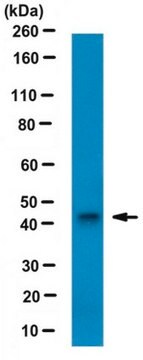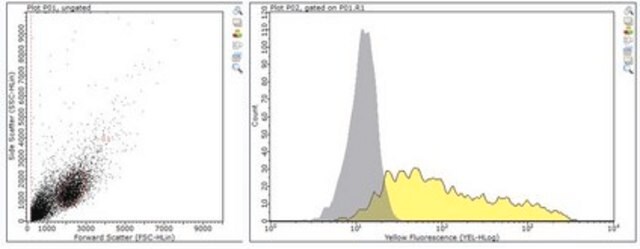MAB1951
Anti-Integrin β1 Antibody, clone P4G11
clone P4G11, Chemicon®, from mouse
Sinónimos:
CD29
About This Item
Productos recomendados
biological source
mouse
Quality Level
antibody form
purified immunoglobulin
antibody product type
primary antibodies
clone
P4G11, monoclonal
species reactivity
monkey, rabbit, human
manufacturer/tradename
Chemicon®
technique(s)
ELISA: suitable
cell culture | mammalian: suitable
flow cytometry: suitable
immunocytochemistry: suitable
immunohistochemistry (formalin-fixed, paraffin-embedded sections): suitable
immunoprecipitation (IP): suitable
isotype
IgG1
NCBI accession no.
UniProt accession no.
shipped in
wet ice
target post-translational modification
unmodified
Gene Information
human ... ITGB1(3688)
Specificity
Immunogen
Application
Ca++ required for binding. Ca++ must be used in blocking, washing, and antibody incubation buffers.
Traditional formalin fixation is not recommended.
Immunocytochemistry: 2 ug/mL (for use on numerous cell lines as long as Ca2+ is present)
Immunoprecipitation: 5 μg/400 μL lysate (0.5% triton PBS plus Ca++)
FACS: 2-5μg per 10e6 cells, in the presence of Ca++.
Stimulation of cells: 2-10 μg/ml per 10e6 cells. Binding buffer must contain 1mM Ca++.
ELISA
Optimal working dilutions must be determined by end user.
Cell Structure
Integrins
Physical form
Storage and Stability
Analysis Note
Tonsil, human skin tissue
Other Notes
Legal Information
Disclaimer
¿No encuentra el producto adecuado?
Pruebe nuestro Herramienta de selección de productos.
Optional
Storage Class
10 - Combustible liquids
wgk_germany
WGK 2
flash_point_f
Not applicable
flash_point_c
Not applicable
Certificados de análisis (COA)
Busque Certificados de análisis (COA) introduciendo el número de lote del producto. Los números de lote se encuentran en la etiqueta del producto después de las palabras «Lot» o «Batch»
¿Ya tiene este producto?
Encuentre la documentación para los productos que ha comprado recientemente en la Biblioteca de documentos.
Nuestro equipo de científicos tiene experiencia en todas las áreas de investigación: Ciencias de la vida, Ciencia de los materiales, Síntesis química, Cromatografía, Analítica y muchas otras.
Póngase en contacto con el Servicio técnico







